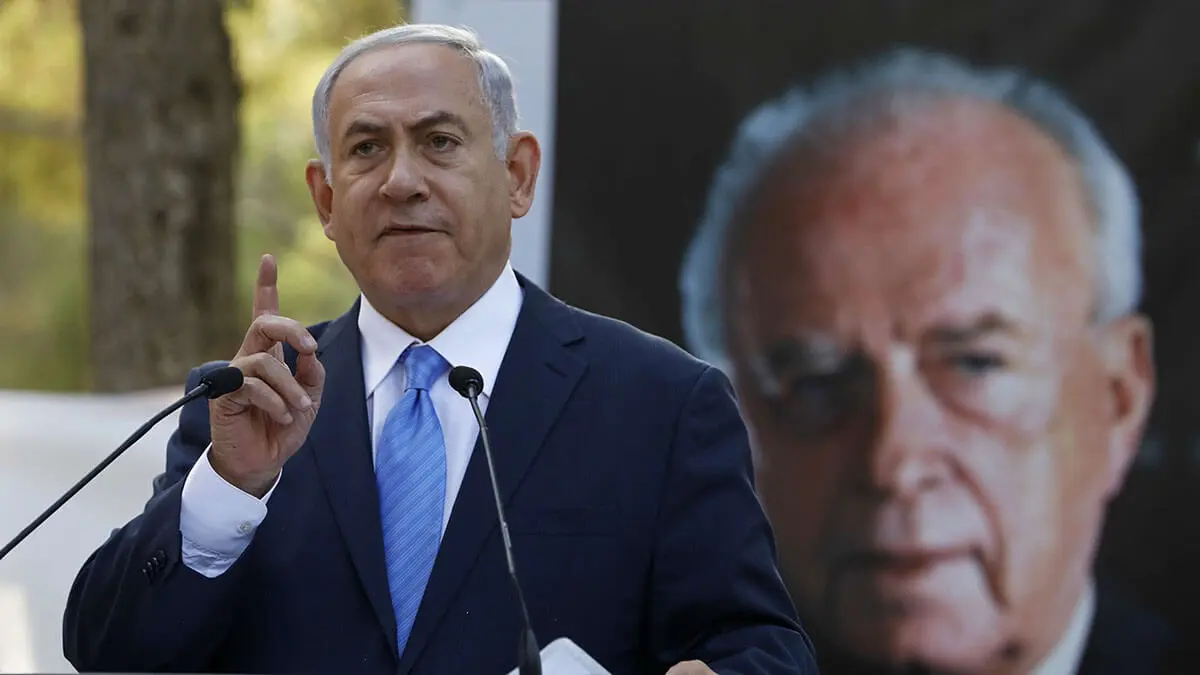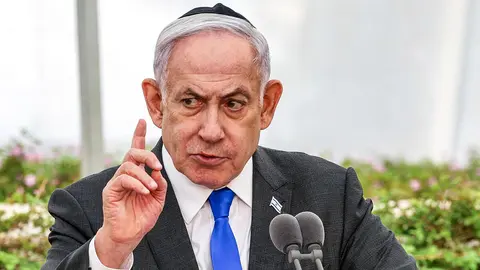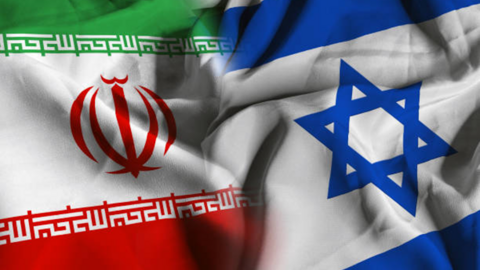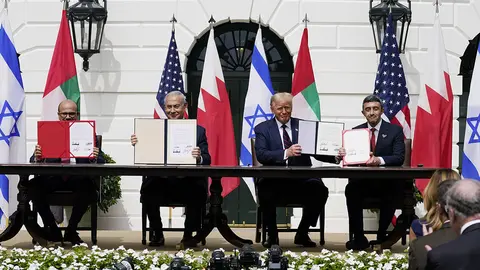Netanyahu: his lifelong dream

‘In July 1995, Benjamin Netanyahu led a mock funeral procession with a coffin and a noose at an anti-Rabin rally where demonstrators chanted death to Rabin. Internal security chief Carmi Gillon alerted Netanyahu of a plot on Rabin's life and asked him to tone down the rhetoric of the protests, which Netanyahu refused to do,’ according to media reports.
In the end, Rabin was assassinated by a 25-year-old Jewish man, and with his death any chance of peace in the region was dashed. A year earlier he had received the Nobel Peace Prize together with Shimon Peres and Yasser Arafat. All three politicians played a major role in the search for peace in the Middle East, but the Jewish ultranationalists, to which Netanyahu belongs, saw the settlements and Jewish settlers as a threat rather than a possibility of coexistence.
Even as a young man, Netanyahu had radical ideas that even spoke of exterminating the Palestinians if necessary for the prevalence of Israel and of taking back the lands of God's people at any cost and at any price.
Today, 75-year-old Netanyahu can finally achieve everything he dreamed of for Israel: more land for his settlers, less for the Palestinians and, if possible, to end their expulsion from the Gaza Strip and the West Bank.
He has the green light. He is backed by the most ultra-nationalist and ultra-orthodox government that governs Israel. Some of its members when they sit in the Knesset speak of extermination or expulsion.
Among Israel's citizens, Netanyahu is hugely unpopular: a year has passed and dozens of people have been kidnapped and it is not known whether they are still alive or have been killed. War is his priority.
So far, his government is delivering on its promise to wage a long war that engages not only Hamas, but also Lebanon and its armed and political group Hezbollah; as well as the Houthis in Yemen. A few days ago, Israeli Defence Minister Yoav Gallant announced that there will be a lethal, precise and surprising response against Iran, which the White House is trying to stop at all costs, fearing that the US military will be dragged into a war in the Middle East.
What is happening in the region? I have sought the opinion of a couple of experts in geopolitical and strategic analysis at a time when Israel has taken fierce revenge for the terrorist attacks of 7 October 2023 committed by members of Hamas and Palestinian Jihad, which left more than 1,200 people murdered in various kibbutzes bordering the Gaza Strip.
To date, the UN estimates that 50,000 Gazans have been killed under the bombs and buildings collapsed by the lethal charges launched by the Israeli army on the Palestinian enclave. And since it began bombing Lebanon, the death toll has already exceeded 2,000.
More than revenge, what the ultra-nationalist and ultra-right-wing Netanyahu government is trying to do is to redefine the map of regional leadership in the Middle East under the pretext of the attacks suffered last year.
In the East, in addition to the natural conflict that has arisen from the emergence of the state of Israel on Palestinian territory on 14 May 1948, there are two opposing forces vying for regional control: Saudi Arabia, which is a Sunni nation, like Egypt and Jordan, versus Iran, which is a majority Shia nation, like Iraq, Bahrain, Yemen, Lebanon and Azerbaijan.
In the midst of these two forces that have been waging a decades-long, primarily Saudi-Iranian arm wrestling match is Israel's conflict with the Palestinians. During Donald Trump's presidency in the United States, the Abraham Accords were promoted as a roadmap for the normalisation of Israel's relations with several Arab countries that were at odds over the situation with the Palestinians and therefore did not recognise the existence of the State of Israel. Thus, for example, relations were normalised between Israel and the United Arab Emirates; between Israel and Bahrain; and, on 6 January 2021, between Morocco and Israel and also between Israel and Sudan.
During the UN General Assembly meeting on 18-19 September last year, a Saudi Arabian delegation met with its Israeli counterpart in New York, after the United States mediated for Saudi Arabia to recognise the sovereignty and statehood of Israel and thus establish economic, diplomatic, trade and business relations.
Less than 20 days later, Hamas and Palestinian Jihad terrorist attacks on Israeli territory interrupted all negotiations that, under the Abraham Accords, Israeli and US diplomacy had been conducting with Arab countries to normalise relations and bring peace to the region.
Iran is accused of being the instigator and financier of terrorism against Israel, while Saudi Arabia remains strangely silent, leaving the Palestinians to their fate.
The focus of the current military tension revolves around Israel's counter-attack on Iran. In this clash of forces, the future is completely uncertain. In the opinion of Pedro González, founder of Euronews, a new order in the Middle East region is at stake.
‘And at the end of the dispute there can only be one winner, either the Islamic and totalitarian Iranian theocracy wins or a new map is imposed in which coexistence and peace prevail,’ he acknowledged with conviction.
In the first case, González affirms, it would mean admitting Israel's disappearance from the river to the sea, as its enemies proclaim; and, in the second case, if Israel prevails, its right to exist would have to be recognised, which would facilitate the activation of the Abraham Accords.
‘There is no doubt in anyone's mind that theocratic Iran ordered these attacks in order to stop the creation of new balances in the region; to prevent peace, harmony and the flow of commercial and economic business with Israel,’ he said.
González, who works as an international analyst for various media outlets in Spain, recalled that for some time now there has been an espionage race on the part of Israel to prevent Iran from acquiring the nuclear bomb.
For Raúl González, an analyst with a military background, the current scenario is nebulous: ‘nobody knows what strategy Israel is playing’ with regard to its future.
‘One year after the bombing of the Gaza Strip, it is true that Hamas is weakened, but it continues to exist, it is not dead. And I don't see that in the future it will disappear and now it invades southern Lebanon to attack Hezbollah but it won't end up eliminating it completely either... rather it will receive more hatred and there will be more anger to take revenge, sooner or later, on Israel and Iran will be there to finance it,’ he said.
Will the Abraham Accords eventually fail?
At least with Saudi Arabia they have yet to be signed... there is no future for Israel and the region if it does not topple the Iranian regime... if it does not completely destroy the threat that they can get the nuclear bomb.
The other unknown has to do with Israel's position towards the Gaza Strip, the West Bank and Lebanon. The UN continues to receive allegations from Palestinians in the area, civil society groups and human rights groups that Israel is again attempting to expel Palestinians from the Gaza Strip and the West Bank in order to maintain an occupation that will allow Israel to repopulate.
Now its troops are moving into southern Lebanon and already more than 300,000 people have been displaced, mainly to Syria. The question that no one knows how to answer is whether Netanyahu's plans really include occupying the Gaza Strip, the West Bank and southern Lebanon, or whether it has once again been a wave of spirals and death in the regional dialectic that has been going on there for 66 years.






